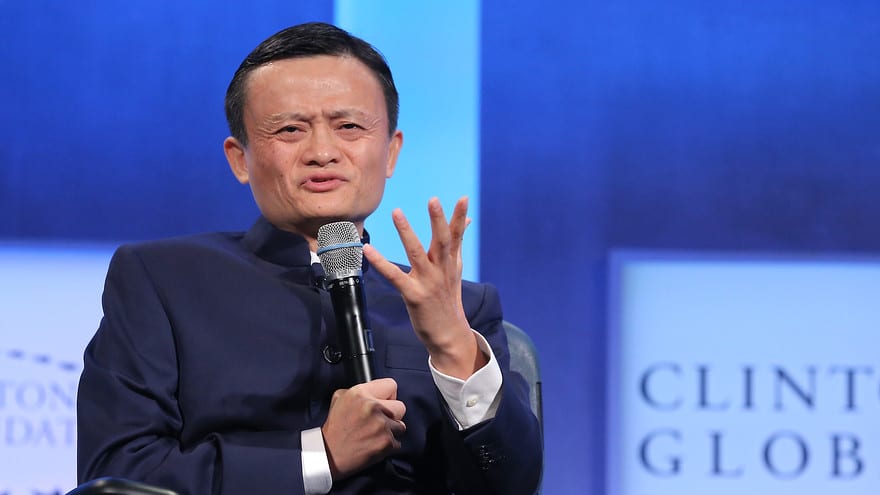
Alibaba chairman Jack Ma was the guest of honour at an opening ceremony for a regional headquaters of the Chinese e-commere company, in Melbourne on Saturday. “We succeed by helping others, by being helped by others. We succeed because we empower the small business,” Jack Ma told the audience.
“So our vision in the next 20 years, we want to create 100 million jobs for the world and we want to serve two billion population of the world and we want to make 10 million small businesses profitable on our platform,” he added. He stressed that Alibaba had a global vision for its business, saying “we believe globalisation is the future.” The newly opened office in Melbourne will serve as Alibaba’s Australian and New Zealand headquarters.
China’s second richest man, Jack Ma, who is the founder of online retail giant Alibaba, said at the opening of the first Australian and New Zealand branch of his company in Melbourne that Australia had something “unique” that China was willing to spend big bucks on.
“Australia is a gold mine. The next gold mine,” Mr Ma said in Melbourne on Saturday.
“The clean water, the soil and the air, this is what you have, the most unique asset.”
With China’s pollution problem, there’s no question as to why China would want to suck up some of Australia’s environment.
China’s “airpocalypse” has seen the country’s pollution hit toxic levels and a blanket of smog the size of Victoria covered Beijing at the end of last year.
People are seeing this as an opportunity in Australia to export our air to China.
Currently New Zealand uses Alibaba, basically the Chinese version of Amazon, to sell fresh air to Chinese consumers.
Oxygen Air bottles the air in aerosol cans and sells them for about $25.
In Australia, up to $1 million worth of air has been bottled and Alibaba could be another opportunity for air farmers to expand their business.
Air is being bottled in the Blue Mountains, Bondi Beach and the Yarra Valley.
Green and Clean company director John Dickinson told the Herald Sun there was a high demand from people in China and India, who hoped the fresh air might clear their lungs.
“A lot of people see the product as a supplement to clean their lungs out with fresh Australian air,” he said.
There are also a number of other Australian products high in demand on the Alibaba site. One of them belongs to Gold Coast woman Brynly King, who expanded her business in her garage — turning it into a multi-million dollar company.
Banaban Virgin Coconut Oil products are now on the shelves in some department stores in China and a number of other countries, all because she started selling on Alibaba.
Alibaba has become the world’s largest retailer since 1999 and debuted on the New York Stock Exchange in 2014, becoming the biggest IPO in history.
Mr Ma went from a struggling schoolteacher to a man who is worth $43.6 billion and he said all it took was hard work and created his company to give small businesses the opportunity to put their products in front of consumers.
Whether you’re a mum and dad making soaps in the garage or a millennial with an invention, Mr Ma aims to give people a place where they can sell, and gives people a chance to buy.
Ma has a long interest in Australia, it started when he was a 15-year-old living in China, and he would hang around western hotels so he could practise his English with tourists.
He met an Australian family from Newcastle and from there realised what the country had to offer, particularly in a business sense.
Many Australian small businesses have put their products on Alibaba to sell to China, and made a motza, like Ms King.
Mr Ma said China has been long known for making products but he said the country needed high quality products and service and didn’t think China today could produce that.
He said China will work with other nations, like Australia, to move from manufacturing to domestic consumption.
There have been concerns that Alibaba could accelerate globalisation, the process of countries integrating into one because of an interchange of world views, culture and products.
Mr Ma doesn’t buy into that.
“Globalisation does not create problems, it shares culture and should always be inclusive. It is the future,” he said.
Australia is the fourth highest seller on Alibaba and Mr Ma believes the Australian office will connect more people to consumers in China and boost our exports.
Alibaba accounts for 60 per cent of China’s sales and Australian shoppers would have most likely heard of Aliexpress, which is one of Alibaba’s market places that is English and rivals eBay.
It sells everything from fast fashion, phone accessories and camping gear.
Mr Ma believes the Australian branch of Alibaba will boost trades in both Australia and China.
The Australian and New Zealand branch of Alibaba will be headed by Maggie Zhou, who was the 48th person employed at the company which now gives jobs to millions.
Ms Zhou said she would introduce new Australian brands to the Alibaba platform.
“A physical Alibaba headquarters is a key step in ensuring Australian businesses have the support and information they need to succeed in China and the rest of the world,” she said.
“Longer term, Alibaba Group’s vision for the ANZ region is to build the entire operating infrastructure needed to enable local businesses to expand globally.”

